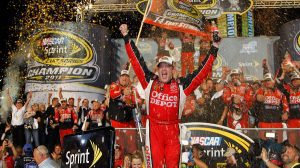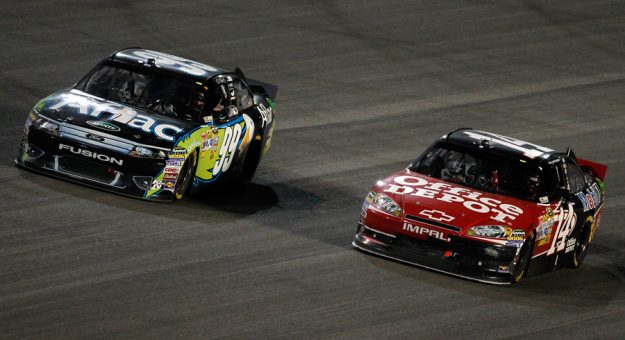Editor’s Note: NASCAR is celebrating its 75th anniversary. SPEED SPORT was founded in 1934 and was already on its way to becoming America’s Motorsports Authority when NASCAR was formed. As a result, we will bring you Part 64 of a 75-part series on the history NASCAR.
Tony Stewart seemed like an unlikely champion at the end of the NASCAR Cup Series regular season, but with a strong performance during the playoffs, he secured his third series championship in the closest title battle on record.
Stewart held off Carl Edwards to win the season finale at Homestead-Miami Speedway, leaving the pair tied atop the standings. Stewart earned the championship based on his five victories compared to one for Edwards.
Barely sneaking into the playoffs by finishing 10th in the standings with no victories through the first 26 events, Stewart won the first two races during the playoffs and then claimed three of the final four to become the first driver-owner to win the title since Alan Kulwicki in 1992.
It was also the first series championship for Stewart’s co-owner Gene Haas. It was also the first series title for crew chief Darian Grubb. Stewart became the only driver to win a Cup championship under the pre-Chase format (2002) and the Chase format (2005, 2011).
Stewart became the ninth driver to win three or more championships in the 63 Cup seasons. He was the eighth driver to win Cup championships for more than one organization and the first since Terry Labonte in 1996 for Hendrick and 1984 for Billy Hagan.

With only nine top-five finishes during the season, it was the fewest by the series champion since Bill Rexford amassed five top-five efforts during the 17-race season in 1950. It was the 28th manufacturer’s title for Chevrolet and the seventh in a row.
Edwards led the points the majority of the season despite his lone victory coming at Las Vegas in March. The Roush Fenway Racing driver had 19 top-five and 26 top-10 finishes.
Kevin Harvick won four races for Richard Childress Racing and finished third in the standings, while Matt Kenseth earned a trio of victories in Jack Roush’s No. 17 Ford and came home fourth in the standings.
Brand Keselowski won three races for Team Penske and wound up fifth. Defending series champion Jimmie Johnson won twice and was sixth in the final run down. Others winning multiple races were Kyle Busch (four), Jeff Gordon (three) and Kurt Busch (2).
There were 18 different race winners in 36 races, the most since 2002. There were also five first-time Cup Series winners, most notably Trevor Bayne, who won the Daytona 500.
The 20-year-old Bayne utilized the tandem draft to earn his first Cup Series win in only his second start, while driving for the legendary Wood Brothers Racing team. It was the fifth Daytona 500 win for the team.
Other first-time winners were Regan Smith, David Ragan, Paul Menard and Marcos Ambrose.
Previous winners, who earned a single victory in 2011, were Denny Hamlin, Ryan Newman, Clint Bowyer and Kasey Kahne.
For the first time since 2001, a new track was added to the Cup Series schedule at Kentucky Speedway. The event replaced a second event held at Atlanta Motor Speedway. In addition, Kansas Speedway gained a second event at the expense of Auto Club Speedway.
For 2011, the Chase field remained at 12 drivers, but would be determined by the top 10 in points after 26 races, and then add two ‘wild card’ drivers, who qualified by having the most regular-season wins among drivers 11th-20th in points.
For the first time since 1975, major changes were made in how points were awarded in a race. Each position would be separated by only one point, with 43 points awarded to a winner down to one for 43rd place. Bonus points included three for the race winner, one for leading the final lap, and one for leading the most laps.
Dale Earnhardt Jr. was named the most popular driver.
Ricky Stenhouse Jr. was crowned Xfinity Series champion and Austin Dillon claimed the Truck Series title.
